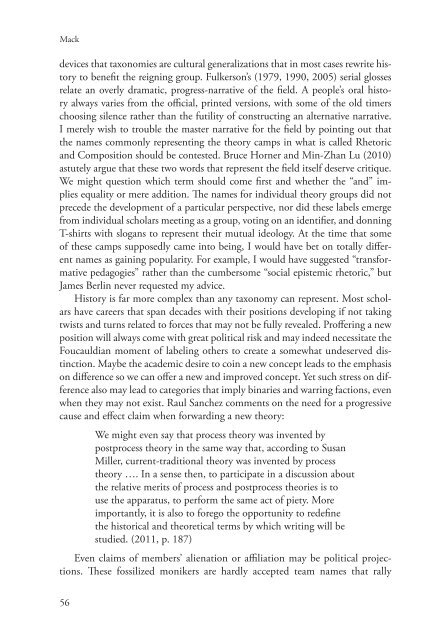Critical Expressivism- Theory and Practice in the Composition Classroom, 2014a
Critical Expressivism- Theory and Practice in the Composition Classroom, 2014a
Critical Expressivism- Theory and Practice in the Composition Classroom, 2014a
You also want an ePaper? Increase the reach of your titles
YUMPU automatically turns print PDFs into web optimized ePapers that Google loves.
Mack<br />
devices that taxonomies are cultural generalizations that <strong>in</strong> most cases rewrite history<br />
to benefit <strong>the</strong> reign<strong>in</strong>g group. Fulkerson’s (1979, 1990, 2005) serial glosses<br />
relate an overly dramatic, progress-narrative of <strong>the</strong> field. A people’s oral history<br />
always varies from <strong>the</strong> official, pr<strong>in</strong>ted versions, with some of <strong>the</strong> old timers<br />
choos<strong>in</strong>g silence ra<strong>the</strong>r than <strong>the</strong> futility of construct<strong>in</strong>g an alternative narrative.<br />
I merely wish to trouble <strong>the</strong> master narrative for <strong>the</strong> field by po<strong>in</strong>t<strong>in</strong>g out that<br />
<strong>the</strong> names commonly represent<strong>in</strong>g <strong>the</strong> <strong>the</strong>ory camps <strong>in</strong> what is called Rhetoric<br />
<strong>and</strong> <strong>Composition</strong> should be contested. Bruce Horner <strong>and</strong> M<strong>in</strong>-Zhan Lu (2010)<br />
astutely argue that <strong>the</strong>se two words that represent <strong>the</strong> field itself deserve critique.<br />
We might question which term should come first <strong>and</strong> whe<strong>the</strong>r <strong>the</strong> “<strong>and</strong>” implies<br />
equality or mere addition. The names for <strong>in</strong>dividual <strong>the</strong>ory groups did not<br />
precede <strong>the</strong> development of a particular perspective, nor did <strong>the</strong>se labels emerge<br />
from <strong>in</strong>dividual scholars meet<strong>in</strong>g as a group, vot<strong>in</strong>g on an identifier, <strong>and</strong> donn<strong>in</strong>g<br />
T-shirts with slogans to represent <strong>the</strong>ir mutual ideology. At <strong>the</strong> time that some<br />
of <strong>the</strong>se camps supposedly came <strong>in</strong>to be<strong>in</strong>g, I would have bet on totally different<br />
names as ga<strong>in</strong><strong>in</strong>g popularity. For example, I would have suggested “transformative<br />
pedagogies” ra<strong>the</strong>r than <strong>the</strong> cumbersome “social epistemic rhetoric,” but<br />
James Berl<strong>in</strong> never requested my advice.<br />
History is far more complex than any taxonomy can represent. Most scholars<br />
have careers that span decades with <strong>the</strong>ir positions develop<strong>in</strong>g if not tak<strong>in</strong>g<br />
twists <strong>and</strong> turns related to forces that may not be fully revealed. Proffer<strong>in</strong>g a new<br />
position will always come with great political risk <strong>and</strong> may <strong>in</strong>deed necessitate <strong>the</strong><br />
Foucauldian moment of label<strong>in</strong>g o<strong>the</strong>rs to create a somewhat undeserved dist<strong>in</strong>ction.<br />
Maybe <strong>the</strong> academic desire to co<strong>in</strong> a new concept leads to <strong>the</strong> emphasis<br />
on difference so we can offer a new <strong>and</strong> improved concept. Yet such stress on difference<br />
also may lead to categories that imply b<strong>in</strong>aries <strong>and</strong> warr<strong>in</strong>g factions, even<br />
when <strong>the</strong>y may not exist. Raul Sanchez comments on <strong>the</strong> need for a progressive<br />
cause <strong>and</strong> effect claim when forward<strong>in</strong>g a new <strong>the</strong>ory:<br />
We might even say that process <strong>the</strong>ory was <strong>in</strong>vented by<br />
postprocess <strong>the</strong>ory <strong>in</strong> <strong>the</strong> same way that, accord<strong>in</strong>g to Susan<br />
Miller, current-traditional <strong>the</strong>ory was <strong>in</strong>vented by process<br />
<strong>the</strong>ory …. In a sense <strong>the</strong>n, to participate <strong>in</strong> a discussion about<br />
<strong>the</strong> relative merits of process <strong>and</strong> postprocess <strong>the</strong>ories is to<br />
use <strong>the</strong> apparatus, to perform <strong>the</strong> same act of piety. More<br />
importantly, it is also to forego <strong>the</strong> opportunity to redef<strong>in</strong>e<br />
<strong>the</strong> historical <strong>and</strong> <strong>the</strong>oretical terms by which writ<strong>in</strong>g will be<br />
studied. (2011, p. 187)<br />
Even claims of members’ alienation or affiliation may be political projections.<br />
These fossilized monikers are hardly accepted team names that rally<br />
56


















